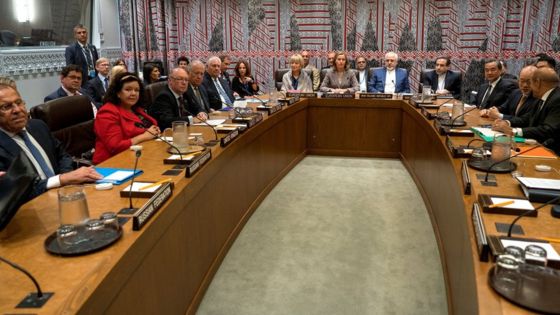
US Secretary of State Rex Tillerson has said Washington continues to have "significant issues" with the Iran nuclear deal, after his first talks with his Iranian counterpart.
But Mr Tillerson said the talks were "very matter of fact", and acknowledged Iran was complying with the deal.
Wednesday`s talks at the UN, involving all seven parties that negotiated the deal, focused on its implementation.
They came a day after President Donald Trump denounced the deal.
At a speech to the United Nations General Assembly, Mr Trump described it as an "embarrassment". He later told reporters that he had decided what to do about the agreement but would not reveal what he had decided.
He has until 15 October to decide whether to certify that Iran is complying with the deal. If he fails to do so, Congress could re-introduce sanctions dropped when the accord was implemented.
The New York Times quoted unnamed administration officials as saying Mr Trump will revisit the deal rather than scrapping it altogether.
Mr Tillerson said Mr Trump found the so-called sunset clause, which sees restrictions on Iran`s nuclear enrichment programme lifted after 2025, unacceptable.
Iran reached the landmark nuclear deal with the P5+1 group of world powers - the US, UK, France, China and Russia plus Germany, in 2015.
What are the different sides saying?
This was the first meeting between Mr Tillerson and Iranian Foreign Minister Javad Zarif.
"It was a good opportunity to meet, shake hands. The tone was very matter of fact. There was no yelling, we didn`t throw shoes at one another," the US secretary of state said, adding that the two sides saw the agreement very differently.
"The agreement has this very concerning shortcoming that the president has mentioned as well and that is the sunset clause. and that`s something that the president simply finds unacceptable," he said.
Warning of a repeat of North Korea`s development of nuclear weapons, Mr Tillerson said Mr Trump had made it clear he did not want to leave Iran`s resumption of its programme for another administration to deal with.
Until the matter was resolved the US would fulfil its commitments, he said.
BBC UN correspondent Barbara Plett-Usher says the US`s Western allies shared Washington`s concerns but have warned against reopening the deal in order to address them.
"We already have one potential nuclear crisis. We definitely [do] not need to go into a second one," EU foreign policy chief Federica Mogherini said, referring to the North Korea nuclear standoff.
Earlier on Wednesday, Iranian President Hassan Rouhani told the UN General Assembly that his country would not be the first to violate the agreement but would "respond decisively and resolutely to its violation by any party".
He said it would be a "great pity" if it were destroyed by Mr Trump, who he referred to as a "rogue newcomer to international politics".
The previous day at the same podium, Mr Trump had described Iran as a "corrupt dictatorship" and an "economically depleted rogue state" that exported violence.
Will the US abandon the nuclear deal?
Crippling economic sanctions on Iran were lifted after the International Atomic Energy Agency certified Iran had restricted sensitive nuclear activities.
Iran says it has the right to nuclear energy and insists its nuclear programme is for peaceful purposes only.
Barack Obama`s US administration said at the time the deal would prevent Iran from obtaining a nuclear weapon.
Speaking on Wednesday, the US envoy to the UN, Nikki Haley, said President Trump`s remarks were "not a clear signal that he plans to withdraw".
"What it is, is a clear signal that he`s not happy with the deal," she told CBS News in an interview.
How is Iran curbing its nuclear programme?
Before the deal there were two uranium enrichment facilities in Iran - Natanz and Fordo - where uranium hexafluoride gas was fed into centrifuges to separate out the most fissile isotope, U-235.
Low-enriched uranium, which has a 3%-4% concentration of U-235, can be used to produce fuel for nuclear power plants, but it can also be enriched to the 90% needed to produce nuclear weapons.
In July 2015, Iran had almost 20,000 centrifuges. Under the Joint Comprehensive Plan of Action (JCPOA), it will be limited to installing no more than 5,060 of the oldest and least efficient centrifuges at Natanz for 10 years.
The centrifuges at Fordo now only produce radioisotopes for use in medicine, agriculture, industry and science.
Iran`s uranium stockpile will also be reduced by 98% to 300kg (660lbs) for 15 years. It must also keep its level of enrichment at 3.


0 comments:
Post a Comment